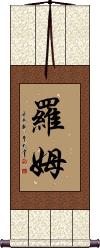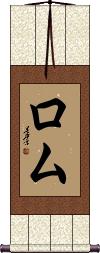Many custom options...
And formats...

The name Rom in Chinese / Japanese...
Buy a Rom calligraphy wall scroll here!
Personalize your custom “Rom” project by clicking the button next to your favorite “Rom” title below...
Not the results for Rom that you were looking for?
Below are some entries from our dictionary that may match your Rom search...
| Characters If shown, 2nd row is Simp. Chinese |
Pronunciation Romanization |
Simple Dictionary Definition |
ロム see styles |
romu ロム |
More info & calligraphy: Rom |
光盤 光盘 see styles |
guāng pán guang1 pan2 kuang p`an kuang pan |
compact disc (CD); DVD; CD-ROM; CL:片[pian4],張|张[zhang1] |
光碟 see styles |
guāng dié guang1 die2 kuang tieh |
optical disc; compact disc; CD; CD-ROM; CL:片[pian4],張|张[zhang1] |
ROM see styles |
romu ロム |
(1) {comp} read-only memory; ROM; (2) {internet} (abbr. of "read-only member") lurker (in an online community) |
ROMる see styles |
romuru ロムる |
(v5r,vi) (net-sl) (See ROM・2) to lurk (in an online community) |
ラーカー see styles |
raakaa / raka ラーカー |
(See ROM・ロム・2) lurker |
ラヴコメ see styles |
rarakome ラヴコメ |
(abbreviation) romantic comedy (wasei: love comedy); rom-com |
ラブコメ see styles |
rabukome ラブコメ |
(abbreviation) romantic comedy (wasei: love comedy); rom-com |
朗読CD see styles |
roudokushiidii / rodokushidi ろうどくシーディー |
audiobook on a CD-ROM |
マスクロム see styles |
masukuromu マスクロム |
(computer terminology) mask ROM |
漢字ROM see styles |
kanjiromu かんじロム |
{comp} kanji ROM |
EEPROM see styles |
ii ii pii romu; iiiipiiromu(sk) / i i pi romu; iipiromu(sk) イー・イー・ピー・ロム; イーイーピーロム(sk) |
{comp} EEPROM; electrically erasable programmable ROM |
マスク・ロム |
masuku romu マスク・ロム |
(computer terminology) mask ROM |
ラブコメディ see styles |
rabukomedi ラブコメディ |
romantic comedy (wasei: love comedy); rom-com |
ロムカセット see styles |
romukasetto ロムカセット |
game cartridge (wasei: ROM cassette) |
固定記憶装置 see styles |
koteikiokusouchi / kotekiokusochi こていきおくそうち |
{comp} read-only memory; ROM |
書き込み可能 see styles |
kakikomikanou / kakikomikano かきこみかのう |
(adjectival noun) {comp} writable (e.g. a writable CD-ROM) |
ラブ・コメディ |
rabu komedi ラブ・コメディ |
romantic comedy (wasei: love comedy); rom-com |
ラブコメディー see styles |
rabukomedii / rabukomedi ラブコメディー |
romantic comedy (wasei: love comedy); rom-com |
ロム・カセット |
romu kasetto ロム・カセット |
game cartridge (wasei: ROM cassette) |
フラッシュROM see styles |
furasshuromu フラッシュロム |
{comp} flash ROM |
ラブ・コメディー |
rabu komedii / rabu komedi ラブ・コメディー |
romantic comedy (wasei: love comedy); rom-com |
Variations: |
romusen ロムせん |
(See ROM・ロム・2) lurker (on a forum) |
読み出し専用メモリ see styles |
yomidashisenyoumemori / yomidashisenyomemori よみだしせんようメモリ |
{comp} read-only memory; ROM |
読み取り専用メモリ see styles |
yomitorisenyoumemori / yomitorisenyomemori よみとりせんようメモリ |
{comp} read-only memory; ROM |
読取り専用記憶装置 see styles |
yomitorisenyoukiokusouchi / yomitorisenyokiokusochi よみとりせんようきおくそうち |
{comp} read-only memory; ROM |
リードオンリーメモリ see styles |
riidoonriimemori / ridoonrimemori リードオンリーメモリ |
(computer terminology) read-only memory; ROM |
リードオンリー・メモリ |
riidoonrii memori / ridoonri memori リードオンリー・メモリ |
(computer terminology) read-only memory; ROM |
倍速CDROMドライブ see styles |
baisokushiidiiromudoraibu / baisokushidiromudoraibu ばいそくシーディーロムドライブ |
{comp} double speed CD-ROM drive; (after number N) x N speed CD-ROM drive |
Variations: |
shii dii romu; shiidiiromu(sk) / shi di romu; shidiromu(sk) シー・ディー・ロム; シーディーロム(sk) |
compact disk read-only memory; CD-ROM |
Click here for more Rom results from our dictionary
The following table may be helpful for those studying Chinese or Japanese...
| Title | Characters | Romaji (Romanized Japanese) | Various forms of Romanized Chinese | |
| Rom | 羅姆 罗姆 | luó mǔ / luo2 mu3 / luo mu / luomu | lo mu / lomu | |
| Rom | ロム | romu | ||
| In some entries above you will see that characters have different versions above and below a line. In these cases, the characters above the line are Traditional Chinese, while the ones below are Simplified Chinese. | ||||
Successful Chinese Character and Japanese Kanji calligraphy searches within the last few hours...





